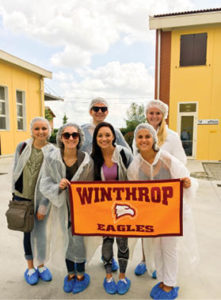Winthrop science courses take students abroad to study various topics in a hands-on setting
The chemistry, physics and geology departments of Winthrop University have three exciting new study abroad courses this year. There is a fall course in December that includes a field trip to the Bahamas taught by Dr. Boyer. The class will travel to the island of San Salvador, Bahamas, from Dec. 27 through Jan. 5th for the intensive field portion of the course with a total cost of $2,999. This is a hands-on course that allows students to observe modern carbonate environments and coral reef communities through travel to a tropical island while evaluating how physical and biological processes are translated into the rock record.
Once on the island, they will survey modern carbonate environments, including modern reefs, as they snorkel from shore and boat, analyzing beaches around the island. They will study fossil reefs and examine modern and fossil shell diversity contributing to a global citizen science project tracking coral health.
They will also study the history of San Salvador Island, cited as Columbus’ first landfall, exploring loyalist ruins on the island from the post-revolutionary war era and discuss how soil conditions and local geology impacted the success and ultimately led to the doom of these plantations. 
Fans of maple syrup would be excited to hear of a spring geology course taught by Dr. Werts leading a trip to Churchill, Canada, this coming summer. The beluga whale and polar bear capital of the world, Churchill is located on the shores of the Hudson Bay in Manitoba. The travel portion will be in August since the roads are still frozen in the spring. The cost of the trip is $2,665, which includes airfare, room and board, all food aside from what students would want to spend during the flights or in town. Churchill is a rare place in that it has a triple junction of ecosystems at that location.
There is the coastal arctic landscape, the boreal forest and the tundra at that location within a short drive. Students will get the chance to kayak with beluga whales on the river for a few hours observing these mammals and their juveniles and listen to them with some of the sounding devices on the tour. Students may also get the chance to view the northern lights.
“Students should absolutely take the chance to study abroad if possible,” Werts said. “It doesn’t cost as much as one might think with financial aid.These sorts of opportunities are something that working adults spend years to save up both time and money to do. Even if my kind of outdoorsy course doesn’t appeal to a particular student, there are plenty of others that might. It is an environment that most don’t get to see due to no roads in or out and long train rides or expensive flights on small carriers to get there. So make sure you get a coke from the polar bears before you leave.”
Those with a penchant for Spain can look into Dr. Grossoehme’s spring biochemistry nutrition course which includes a 10-day trip at the end the end of the semester. Lucia Rodriguez, a senior chemistry student, took a trip to Italy with Dr. Grossoehme last year for her nutrition course. She discovered the course at the Study Abroad Fair and was interested because of her Italian heritage.
“The opportunity was too good to pass up,” Rodriquez said. “It was a great way to end the year.”
She learned about the Mediterranean diet, which was expanded upon in the trip by visiting Nice, France, where they toured a mill that produced authentic olive oil, as well as a winery where they saw the vineyards. They visited the Walks of Italy in Modena, Italy, to learn about original balsamic vinegar.
“We stayed in each city two or three days in hotels, prepaid with the price of the course which was around $3,000, flight, hotel and food included, and visited places as a group,” Rodriguez said.
She recommended the course for those who want to travel but can’t afford it with family or vacation, while also integrating it with other courses to have an experience that is completely different.
Those who are interested in a science study abroad course should contact Pat Owens of the Chemistry Department at owensp@winthrop.edu.



